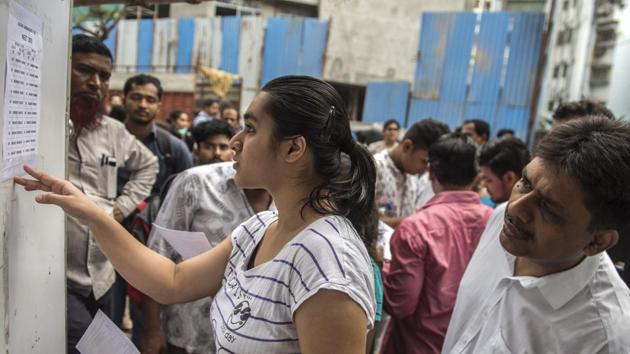School report cards to drop grades from Class 1-8, avoid comments like poor, slow and dull
The National Council for Educational Research and Training has prepared the document which will be applicable for classes 1 to 8.
The progress report (or report card) of students between classes 1 and 8 should no longer carry comments such as slow, poor, and dull, and will also not display any scores or grades, so as to prevent under-performers from developing a sense of inferiority, according to a revised government policy guideline that Hindustan Times has seen.

Schools will have to maintain the progress report in the form of a diary or a log which will require teachers to simply tick a scale linked to the learning outcomes achieved by the student, the guideline says.
These changes are part of revised policy guidelines called Continuous Comprehensive Evaluation, commonly known as ‘CCE’ which was introduced as school-based system of evaluation as per Right of Children to Free and Compulsory Education Act, 2009 (RTE Act, 2009), implemented in April 2010. The policy guidelines have been shared with the states. Education is a so-called concurrent subject in India, which means both the centre and the states have the right to make laws on it.
The National Council for Educational Research and Training (NCERT) has prepared the document which will be applicable for classes 1 to 8. Earlier the Central Board of Secondary Education (CBSE) was the implementing body for CCE.
NCERT director Hrushikesh Senapaty said the guidelines have been shared with all the states for their comments and a national conclave will be held to finalise the policy.
The Act requires that Continuous and Comprehensive Evaluation be implemented for children till the completion of elementary schooling.
It has also been suggested that separate progress report cards should be maintained for children at a particular stage; i.e. one progress report card for a child at the primary stage with a separate one at the upper primary stage. This will help trace the learning progression within and across stages.
”Only specific observations pertaining to children’s performance and behaviour which need to be highlighted to facilitate both students and teachers reflect and review their work, may only be noted in a diary or a logbook. The observations on learning outcomes depicting Personal Social Qualities (PSQs) may be noted as and when required/noticed,” says the policy
The guidelines have been developed keeping three major purposes of assessment in mind: ‘Assessment for Learning’, ‘Assessment as Learning’ and ‘Assessment of Learning’. It also involves getting students to evaluate themselves as well as their peers.
“The process of rubric based self and peer assessment or assessment by the teachers helps students get acquainted better with the task at hand. It is not expected that students will be able to assess themselves accurately during early grades. However, it is important that the skills of reflection and critically reviewing one’s own work are developed over a period of time. For this opportunity need to be given right from the early stages and the teachers need to be patient in this process,” says the policy.
An educationist welcomed the guidelines as progressive but added that it was important to display the same approach beyond class 8 too.
“These deliverables are essentially what the CCE was supposed to look into the beginning as well, but unfortunately at the time because of the lack of teacher training and awareness, it had been reduced to a series of tests. We were supposed to asses what and how the children were learning, and this cannot be defined by marks or structures or timetables,” said Ameeta Wattal, the principal of Springdales School Pusa Road in Delhi.
“This kind of system can easily be implemented by schools from nursery to class 8, and some progressive schools already do it... but the problem is what comes after class 8. In class 9-12, the students are abruptly pushed into a system of scores, marks and exams; this can be traumatic. We need to rework the entire education system from nursery to class 12, and then our higher education as well,” said Wattal.
Get latest news on Education, Bihar Board 12th Result 2024 Live along with Board Exam, Competitive Exam and Exam Result at Hindustan Times. Also get latest Job updates on Employment News










